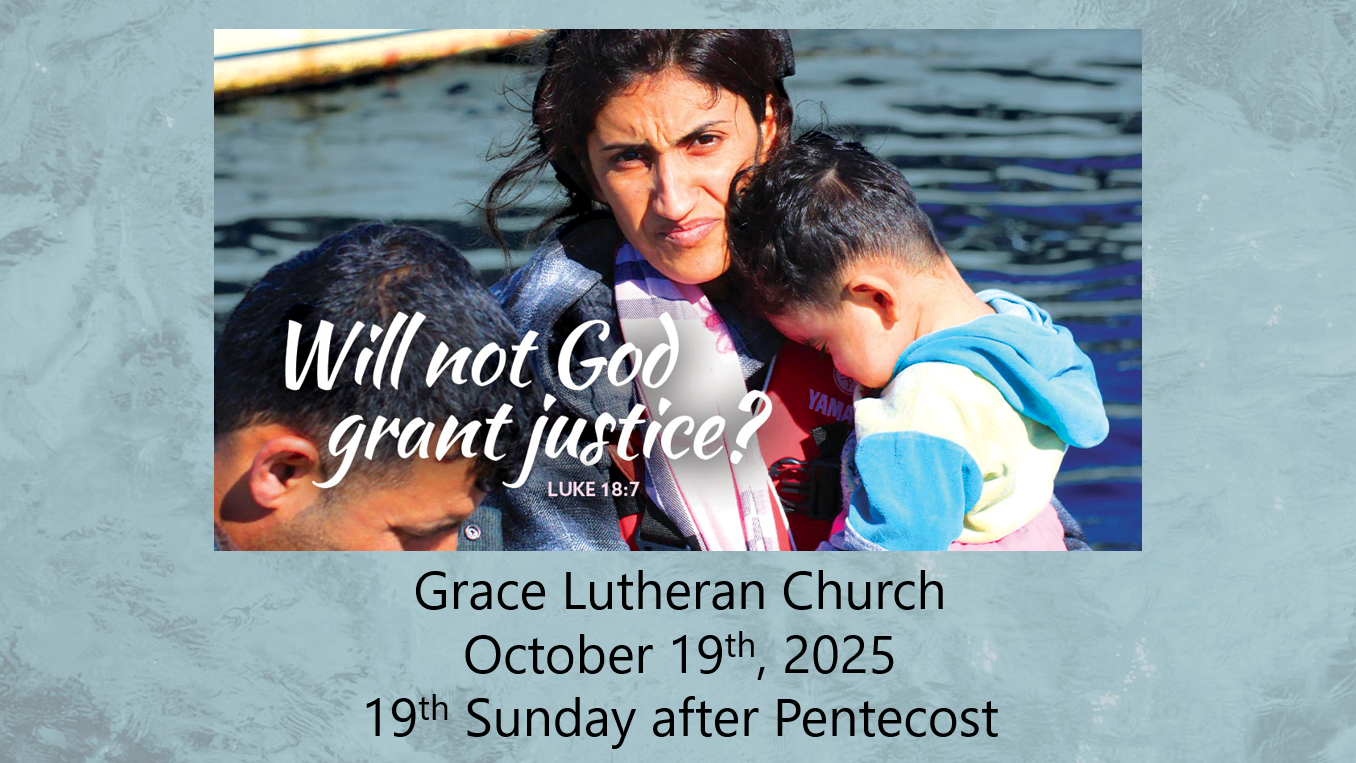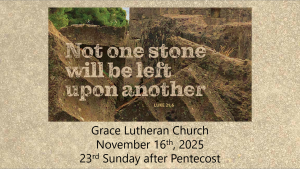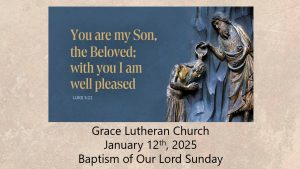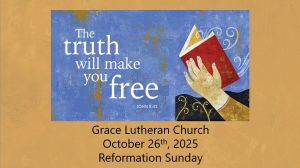Hi everyone,
Welcome to worship for October 19, 2025, the 19th Sunday after Pentecost.
The bulletin for this service can be found here. You’ll find everything you need to follow along with the service in it, or you can use the words that will appear on your screen. The full sermon manuscript is both in the bulletin and on the bottom of this page.
If you’d like a fuller online worship experience, you can have a lit candle in your space for most of the service and extinguish it near the end after the sending hymn. You are also welcome to participate in communion if you are comfortable, by having something small to eat and drink ready for the appropriate time. Further instruction will be given then.
May you continue to feel God’s presence in your lives, giving you joy and peace and confidence in the gospel, now and forever!
Lord, may your Word speak to us, your Spirit change us, as your love welcomes and saves us, through Jesus Christ. Amen.
Have I ever told you how much I dislike my name?
Nothing against my parents who gave me the name, and I understand their reasoning behind it, it’s just that “Nathan” isn’t the most suitable name for this Asian kid with an Asian face living in what was a very non-Asian society. For starters, my name is difficult to actually write out on paper. Have you ever tried to stylise a capital N before? My signature sucks and is ugly as heck. And then there’s the spelling of it. Like what is even supposed to be between the “T-H” and the “N”? I’ve literally seen every possible vowel in there, even a U somehow. And don’t get me started on how hard it is to pronounce, especially for folk who share my Chinese heritage but not my English as a first language upbringing. I couldn’t tell you how many people were told that my name is “lay-FUN”.
But all those aside, the main reason why I don’t like my name is because… well… people barely ever get it right the first time they hear it. I’ll be like, “Hi, I’m Nathan” and the response will be more often than not,
“Jason?” No.
“Mason?” No.
“David?” No.
“Lay-fun?” meh close enough.
Just the other day I was ordering pizza and the person on the phone asked me my name. I cringed because I have a feeling what is likely to happen next. And sure enough, after I told them they were like “Grayson?” I said no and spelled it out for them. But I still didn’t think they got it right so I repeated it again like 3 or 4 more times but they got a bit frustrated and said it’s fine because they have my number anyway. Ok, information that would have more useful 5 minutes ago, but whatever, as long as I get my correct order.
Well, when we got to the pizza place, it turned out they didn’t need my name or number after all as mine was the only order being picked up. After we left my wife noticed the name on the receipt. It said “Tharsan”. No offense to any Tharsan’s out there, but that’s like a whole extra letter than I even gave them. Out of all the times people got my name wrong, I’m going to have to say that this one was the most wrong. So yeah… I’m not a big fan of my name.
But I can’t escape it. It’s the one that’s been given to me. No matter how much I try to change it up with different nicknames I gave myself as a kid, like Nate, Nature Boy, Nat Man, Nathugimus Prime, Naturedamus, Nathanos, or Pastor, I will always just be me. You know, Tharsan. I mean Nathan.
So when I read the story that we get in our first lesson today, how Jacob got his name changed without even really trying, I’ll admit that I get just a little jealous. Sure, he had to wrestle a random stranger for several hours and walked away with a likely permanent limp, but at least he won’t be called the heel-catcher anymore. That’s what the name Jacob means, if you remember. He is the younger of twin brothers, and when the older brother Esau, whose name means “hairy” by the way, when he was born, it is said that Jacob wasn’t far behind, holding on Esau’s heel, and so he was named just that. And thus started their life-long feud and Jacob always living in the shadow of his brother, who is just seconds older but bigger, stronger, and apparently hairier.
And I thought my name was bad.
We don’t put that much weight on name-meanings these days so “Jacob” is a perfectly fine name. In fact, it’s super popular as there are like 5 in my son’s class alone. But in these bible times? The meaning of your name was everything. It was who you are, your whole identity, the brand that you just can’t escape. So Jacob’s name would have been a constant reminder of how he’s inferior to his brother. Every time someone would call him, greet him, or take down his pizza order, it’d be drilled into his head how he’s just second place. Every time someone even says it, Jacob is driven deeper into this label.
But it isn’t wrong. I mean Jacob was conniving and manipulative. He ended up essentially being everything that his name said he’d be. For the first part of his life up to this point in his story, he was living up to the heel-grabber moniker, the label, the identity that was given to him.
But then God changed it.
That name, that label, that identity, no longer the heel-grabber, but now, the god-wrestler. Saying it out loud, I’ll admit that it doesn’t sound much better, but at least it’s different. Jacob is now Israel, who goes eye to eye, toe to toe, mano a mano… with God. I mean, it’s doubtful that he’ll ever come out on top, I mean this is God we’re talking about. But such a name would seem to evoke fear, respect, and intimidation. And Israel does just that. Maybe even to this day.
But what strikes me about this story is that how changing the name changes the person. Rebranding that label and suddenly the identity shifts. Call someone something for long enough, and they just might believe it to be true.
And that brings us to our gospel lesson for today. Another parable of Jesus, but this time about the unjust judge who doesn’t fear God nor have respect for people. Clearly this man isn’t supposed to be seen as a nice person just by this description alone. But for some reason, the widow goes to him anyway, not to change his name, but perhaps his label.
I mean even when the judge has given all the reason not to, this persistent widow, this thorn in his side, this believer that he isn’t just a sum of his past, went to him for the very thing that he’s known not to give. But she didn’t give up. She wouldn’t let it go. She persistently wrestled with his nature and teased out the good. She was able to remind him of who he can be and what he can do in spite of the reputation that was given to him. She got him to rethink what he’s about, his place in the world, and his very being and identity.
I know, that sounds like a lot of reading into just a few lines of a story, but I can’t buy the whole “pray persistently to get what you want from God” lesson that we often get for this passage. To me, that sounds too much like “health and wealth” preaching, and I just don’t think that is something God would want us to learn. But a lesson like “pray persistently to change the world” does. Pray persistently to change the outlook that we have on others and ourselves. Pray persistently to reshape the labels that have dictated who we are and kept us from living in community, mercy, and love.
See in just a few lines of parable, Jesus shows us that we aren’t beholden to our reputations. We aren’t slaves to the labels that we’ve been given and perhaps even earned. We’re not only what we’re told we are. And then we can push past those label and identities and see how we are called by name to be beloved, cherished, and saved children of God.
Of course, this doesn’t mean that we’re perfect. This doesn’t entitle us to get everything we want. This doesn’t even mean that we will no longer be mislabelled or people won’t get our names wrong anymore. But it does mean that even in our spotty track records, even in our shady pasts, even in our inability to live down the names and labels that we’ve been given, God remains with us, reshaping us and reforming us, and reminding us that we are so much more than what the world tells us that we are, we worth more to God and our communities than we might tell ourselves we are, and we are loved beyond anything we could ever ask or imagine.
So the persistence that the widow in the parable shows, may that be the persistent voice of God telling us who we are. The wresting that Jacob engaged in for a blessing, may that be the wrestling we have with what the world tells us we are versus the blessing that God has always and will continue to give. The change in heart, mind, and label that is seen throughout these texts, may that be a call to us to see God at work in our lives, and to lean on the strength of God’s everlasting arms to guide us, equip us, and name us as God’s own beloved people. Thanks be to God. Amen.




